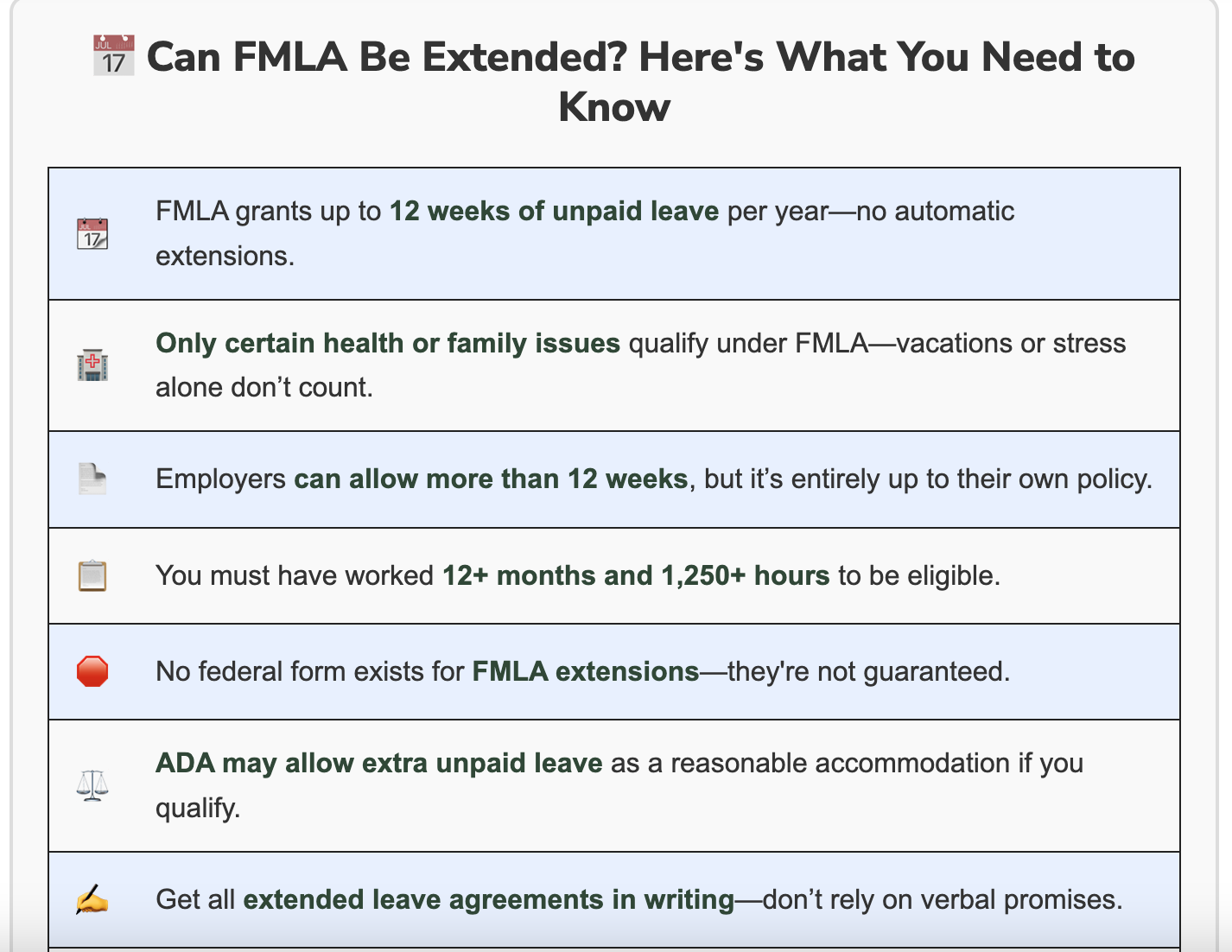
The Family and Medical Leave Act (FMLA) of 1993 was intended to help families balance work and home responsibilities by requiring covered employers to provide up to 12 weeks of unpaid, job-protected leave to eligible employees for a serious health condition of their own or that of a family member.
The Family Medical Leave Act also permits additional leave to care for a military service member in the employee's family. During FLMA leave, the employee’s position is protected, allowing them to return to work at the same or similar job with similar pay and benefits. FMLA guidelines for employers require the continuation of health benefits, if any, for employees on FMLA. The employee must be reinstated and cannot be terminated for taking this protected leave. Although the FMLA provides a minimum level of support for family caregivers, if you're wondering "can fmla be extended beyond 12 weeks?",employers are free to allow more than the legally-required 12 weeks of unpaid leave per year if they choose.
The FMLA covers lost work time for family and medical reasons. Except in instances of an emergency, an employee should provide appropriate notice to an employer at least 30 days before taking leave under the FMLA.
An employee must have worked at the same company for more than 12 months before he is eligible for leave under the FMLA. In addition, the employee must have worked 1,250 or more hours before the start of the leave period and work at a location with 50 or more employees within 75 miles of that location.
Acceptable reasons for leave under the act include the birth of a child or care of a newborn (mother or father), for placement of a child from adoption or foster care and to care for the child, to care for an immediate family member with a health condition, or when the employee cannot work because of their own serious health condition. FMLA leave is limited to 12 total weeks in a 12-month period for all the aforementioned reasons combined.
“Serious health conditions” under the FMLA include conditions that result in incapacity, pregnancy, chronic health conditions, conditions for which treatment is unavailable and absences for multiple treatments. To qualify, an employee must suffer some measure of incapacitation that diminish the employee's ability to fulfill other requirements. The simple presence of a physical or mental ailment may not be enough to qualify. A company may require you to provide medical certification for an employee's medical leave. An employee has at least 15 calendar days to obtain medical certification.
An employee may be denied FMLA if they do not fall into an eligible need category. Other life circumstances, even those considered to be very serious, do not qualify the employee for FMLA leave. For this reason, some employers opt to provide their own family leave options for those undergoing a family or personal crisis that does not meet FMLA criteria.
FMLA allows for an employee to take up to 12 weeks of unpaid leave each year. They can take the time all at once or in increments. The FMLA only covers 12 weeks of time; any additional time off granted by an employer for medical reasons is not covered by the FMLA. However, many employers provide additional time off as a reasonable accommodation.
An employee should be sure to get the agreement for extended time off in writing with the stipulation that they are guaranteed to have the same or similar job with the same pay when they return. The 12-month FMLA accrual period can be calculated several different ways -- by calendar year; as a 12-month fixed year, such as a fiscal year; a 12-month period beginning on the date of an employee's first FMLA leave; or by a 12-month period measured backward from the date of an FMLA absence.

The FMLA does not provide for time beyond the 12 weeks covered in the law, so no federally-required extension form exists. Whether the employee can get an extension is up to the employer's own policies. FMLA applies concurrently with other leave laws, such as the Americans with Disabilities Act (ADA) and Equal Employment Opportunity Commission (EEOC). There is no apparent obligation under the FMLA for an employer to notify employees when their leave is about to expire or to proactively ask if an accommodation is needed under the ADA.
However, a good practice is to provide notice to employees in advance, in writing, of the business day of leave expiration and then request information regarding the ability to resume work, including the anticipated date of return. As part of this process, an employer may also inform employees of the option to engage in a discussion about accommodations under the ADA to assist them in returning to work, or to request additional leave because they are unable to return to work upon the expiration of the FMLA leave. If extended leave is needed under the ADA, the employer may request medical documentation to substantiate the existence of an ADA-qualifying disability and also the need for accommodation. Not all employees who qualify for an FMLA leave of absence due to a serious health condition will qualify for an ADA accommodation, although many employees with medical impairments will.
Employers may have an obligation to provide a reasonable accommodation even after an employee's FMLA leave ends. An interactive process is necessary to determine – on a case-by-case basis – if it is an ADA-qualifying situation, and if it is possible to extend the leave period without it posing an undue hardship on the business. Under the ADA, there is no specific amount of leave time that is required as an accommodation. Thus, it is up to an employer's discretion to determine if and how much leave is reasonable and if they can provide reasonable accommodation so the employee can return to work with restrictions. The employer may also have an obligation under the ADA to grant additional unpaid leave as an accommodation.
When ADA medical leave is granted, the employee's leave is granted as an accommodation and the employee remains an employee and entitled to return to an open position to which they are qualified, but not necessarily the position they had when they went out on leave. Employers are not required to hold a position open if doing so will pose an undue hardship on operations. An employer does not have to provide a reasonable accommodation that would cause an "undue hardship" to the employer. According to the EEOC, a determination of undue hardship should be based on several factors, including:
Keep in mind that in some states, such as California, employers cannot ask for medical diagnosis information or communicate with the employee's doctor about the employee's medical condition without the employee's consent. Employers should use forms that are compliant with the California Family Rights Act, rather than the FMLA, so they do not ask unauthorized questions under state law.
The 12 weeks of FMLA leave are unpaid and can be taken by the employee in one block or a manner comfortable to them. The employee can also take one day off a week for medical treatment or in a progressive manner. However, the law instructs the employees to inform the employees 30 days before the leave. But in case of emergency, employees can report the employers as soon as the circumstances come to their notice.
The FMLA guarantees only unpaid leave time that is designated under the law, not paid leave. The law, though, does allow an employee to use accrued paid time off (such as vacation) so that she can receive pay during leave. An employer must notify an employee that this paid time will count toward the 12-week yearly FMLA maximum. FMLA leave must be agreed upon before an employee takes time off and should not be counted retroactively. The employees cannot piggyback the laws and obtain an extension of leaves from the employers.
FMLA is not vacation time. Since these leaves are granted for medical and family emergencies, the same can’t be taken for vacations or holidays. Also, these are unpaid holidays which must be informed to the employers in advance.
At Freeburg & Granieri, one of our main practice areas is employment law, and by working with our attorneys, employees and employers can benefit from a confidential attorney-client relationship in handling your FMLA leave issues. If you're wondering "can fmla be extended beyond 12 weeks?", or if you have any other employment law questions or concerns, we are happy to help. Contact us today for a consultation.
Our clients become friends, confidants, and repeat customers. Former clients are our best referral source.
Do not be a commodity, find an attorney who treats your legal issue with the care it deserves.
